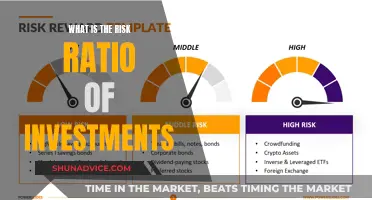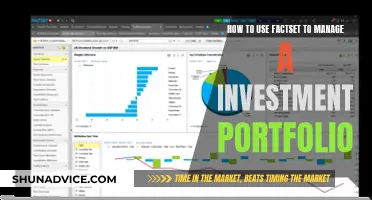
Investing your savings can be a great way to make your money work for you, but it's important to understand the risks and rewards of different investment options. Generally, lower-risk investments like savings accounts and certificates of deposit (CDs) offer slower but steadier growth, while higher-risk options like stocks and mutual funds offer the potential for rapid growth but come with greater risk. Here's an overview of some popular investment options, from lowest to highest risk:
1. High-yield savings accounts: These accounts offer higher interest rates than traditional savings accounts, making them a good option for short-term savings or emergency funds.
2. Certificates of deposit (CDs): CDs are federally insured savings accounts that offer a fixed interest rate for a defined period, usually one to five years. They are ideal for saving for specific goals but may charge penalties for early withdrawals.
3. Money market accounts: These accounts offer higher interest rates than savings accounts and often provide check-writing privileges. They are insured by the FDIC or NCUA.
4. Bonds: Bonds are a form of fixed-income investment where you lend money to a company or government. Lower-risk bonds like government or corporate bonds tend to have lower interest rates, while high-yield bonds offer higher returns but come with greater risk.
5. Mutual funds: Mutual funds pool money from multiple investors to purchase stocks, bonds, or other assets. They offer diversification and are a convenient way to invest in the stock market, but they may have minimum investment requirements.
6. Stocks: Investing in individual stocks can offer the potential for high returns but also carries higher risk. It's important to diversify your portfolio and limit individual stock holdings to a small portion of your overall portfolio.
Before investing, it's crucial to assess your financial goals, risk tolerance, and time horizon. For short-term goals or emergency funds, low-risk, liquid investments like high-yield savings accounts or CDs are usually the best option. For long-term goals like retirement, investing in stocks or mutual funds can provide greater potential for growth, but with higher risk. It's also important to consider fees, minimum investment requirements, and tax implications when choosing an investment option.
| Characteristics | Values |
|---|---|
| Risk | Minimal to high |
| Returns | Predictable to fluctuating |
| Accessibility | Immediate to barriers |
| Good for | Short-term needs to long-term goals |
What You'll Learn

High-yield savings accounts
- Barclays Tiered Savings Account: 4.50% APY for $0 to<$250k; 4.80% APY for $250k+ balance
- SoFi Checking and Savings: 4.20% APY for those with Direct Deposit or $5,000 or more in Qualifying Deposits during the 30-Day Evaluation Period
- CIT Bank Platinum Savings: 4.70% APY on balances of $5,000 or more
- American Express High Yield Savings Account: 4.00% APY as of October 24, 2024
- Forbright Bank Growth Savings: 5.00% APY
- EverBank Performance Savings: 5.05% APY
- Capital One 360 Performance Savings: 4.00% APY
- UFB Portfolio Savings: 4.57% APY
Yotta Savings: A Smart Investment Strategy for Your Money
You may want to see also

Money market accounts
When choosing a money market account, look for accounts with competitive yields, confirm if they offer check-writing privileges, and ensure you won't be paying any unnecessary fees. Some of the top money market accounts as of November 2024 include Vio Bank, Quontic Bank, and Ally Bank.
Maximizing UK Savings: Investment Strategies for Beginners
You may want to see also

Certificates of Deposit (CDs)
CDs are a safer and more conservative investment option than stocks and bonds, but they offer a lower opportunity for growth. They are a good option for those who want to earn more than they would with most savings, checking, or money market accounts without taking on more risk. CDs are also a good option for those who want to save for a specific goal, such as a down payment on a house, a new car, or a vacation.
When shopping for a CD, it is important to compare different offers by looking at the term (the length of time you agree to leave your money in the CD), the interest rate you will earn, and the amount of any penalty for withdrawing money before the end of the term.
CDs come in a variety of terms, typically ranging from 3 months to 10 years. The interest rate on a CD is usually fixed, but there are also variable-rate CDs that could earn a higher return if interest rates rise. Generally, the longer the term, the higher the interest rate.
It is important to note that CDs have less flexibility when it comes to withdrawing funds early. If you withdraw your funds from a CD before the maturity date, you will typically be charged an early withdrawal penalty. This penalty is usually a number of months' interest, but it can vary depending on the financial institution and the length of the CD term.
CDs are a good option for those who want to save for specific goals and are willing to keep their money in the account for the specified term. They offer a higher interest rate than savings accounts and are a safer investment option than stocks and bonds. However, it is important to carefully consider the terms and potential penalties before opening a CD account.
Equity Linked Savings Schemes: A Smart Investment Guide
You may want to see also

Treasury bills
T-bills are usually sold in denominations of $100, with a minimum investment requirement of $100, and can reach a maximum denomination of $5 million in non-competitive bids. The Treasury sells T-bills during auctions using a competitive and non-competitive bidding process. T-bills are issued at a discount from the par value, also known as the face value. When the bill matures, the investor is paid the face value of the bill they bought. Since the face value exceeds the purchase price, the difference is the interest earned for the investor.
T-bills are one of the safest investments available, but their low-risk nature also means they generally provide lower yields than other investments. They are considered a good option for investors looking for a safe and secure investment with a short-term maturity. T-bills are also a good investment for individuals looking to make a large purchase in a short timeline, as the money will only be tied up for a maximum of a year.
You can buy T-bills in electronic form from TreasuryDirect, the platform of the US Treasury, or through a brokerage firm, which could cost a small fee. To buy T-bills from TreasuryDirect, you will need to gather the following information: your Social Security number or taxpayer identification number, a US address, and checking or savings account numbers you'll use for your payments. You will then need to select the account type, enter your personal information, create a username and password, verify your account, make your choice, review and confirm, and submit the order.
National Saving Certificates: Smart Investment Strategies
You may want to see also

Mutual funds
- Types of Mutual Funds: There are several types of mutual funds, including stock, money market, bond, and target-date funds. Stock funds invest primarily in equity, while money market funds focus on short-term debt instruments and cash equivalents. Bond funds invest in government and corporate debt, and target-date funds automatically adjust their asset allocation to become more conservative as the target date approaches.
- Advantages of Mutual Funds: Mutual funds offer diversification, professional management, and a variety of investment options. They are highly liquid, making it easy to buy or sell shares. They also provide economies of scale and enable dollar-cost averaging.
- Disadvantages of Mutual Funds: Mutual funds often have high fees, commissions, and other expenses. They may also have a large cash presence in their portfolios, making it difficult to compare funds and understand their holdings.
- Investing in Mutual Funds: When investing in mutual funds, it is important to consider your financial goals and risk tolerance. You can invest in mutual funds through an employer-sponsored retirement plan, such as a 401(k) or 403(b), or by opening a brokerage account. It is recommended to research potential mutual funds, considering factors such as past performance, expense ratios, load fees, and management style.
- Fees and Expenses: Mutual funds typically charge annual fees, expense ratios, or commissions, which can significantly impact overall returns. It is important to understand the fees associated with a mutual fund before investing.
- Returns on Mutual Funds: Returns on mutual funds come from distributions of income from dividends or interest, as well as capital gains from selling fund securities at a profit. The total return includes any interest, dividends, or capital gains generated, along with the change in the fund's market value over a specific period.
Investing in New York's 529: A College Savings Guide
You may want to see also
Frequently asked questions
There are several ways to invest your savings, including stocks, bonds, mutual funds, exchange-traded funds (ETFs), certificates of deposit (CDs), savings accounts, and more. The best option for you depends on your particular risk tolerance and financial goals.
In general, you should save to preserve your money and invest to grow your money. Depending on your specific goals and when you plan to reach them, you may choose to do both.
Savings accounts are a good option if you have immediate or near-term expenses that your monthly income wouldn't cover. They are also a good choice for emergency funds or cash you need within the next three to five years.
Investing is a good option if you want to grow your money over the long term, making it a strong option for funding expensive future goals, like retirement.







